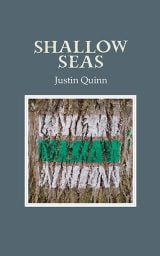For the first time since his debut in 1995 Justin Quinn in Close Quarters, his fifth collection, turns his careful gaze on Ireland, from the 1980s to the present, and especially on Blackrock in County Dublin where he grew up. As the book’s title hints, embraces and battles take place at close quarters. Clashes occur both in relationships and between countries, and the poems ring the change on ‘amour and attack’ as he writes about marriage, being a parent, the cold wars and cultural exchange. A series of pastoral poems refract the months of a year while the collection confirms its author as an adept of the concise idea, a new directness of expression and a singing line.
In Poetry Review Michael Hulse commended Justin Quinn’s ‘polished, urbane manner that owes something to Brodsky . . . its great attraction as poetry lies in the lithe lyric gift . . .’ and remarked on ‘. . . the density Quinn commands even at his seeming simplest . . . light in its touch, engaging in tone, and civilized in stance.’
Justin Quinn’s ‘close quarters’ are various . . . Quinn’s wide-eyed but intelligent fascination with his environments, coupled with his talent for getting at the universal through the local and personal, has much to do with why this collection is so enjoyable to read. He is a realist, with a strong social conscience and sense of history… The close quarters in Close Quarters, then, are undoubtedly the poet’s. But we might see something of ourselves in even his most personal poems.
— Times Literary Supplement, Rory Waterman
Justin Quinn imposes a confident, stylish, consistent and highly satisfying formality of expression on the continuum of life in middle Europe, domesticity and home thoughts from abroad. He writes coolly and wittily, and with great flair, on human relationships, landscapes — or more specifically rural moods and atmospheres — and urban streetlife, when his internal private detective clicks memorable snapshots of, say, a Russian girl (‘The way you walk is slash and burn. / Like understatement’s now a crime’) or a prostitute (‘Peroxide buzz-cut and butch look, / she’s over forty, tanned and built. / She makes her way off at full tilt, / and deeply couldn’t give a fuck / / right now for anything that’s said’).
Quinn’s innate sense of ordering the universe, of making sense of the revolutions of nature, the mystery of language (especially in the art of translation) and the messiness of human relations reaches high points in a number of poems, not least ‘Divorce’, a tender and poignant elegy of what was and what might have been, as the first three stanzas show:
You sleep there underneath
four squares of blue, your clay
dilating as you breathe,
oblivious of the day.
Which is birdsong, the slight
sea-noise of cars below,
serrated insect flight,
a chainsaw on the go
within a wooded ghyll,
working its way through
part of our world. These fill
the azure over you . . .
The lines carry through to an ending where words are unnecessary and thoughts are left hanging: ‘When you wake up I see / the fathoms that you swam, / and your eyes ask of me / who on earth I am.’ Whether in short lyrics such as this one or in the longer pieces — for example the calendrical sequence ‘The Months’ and the retrospective ‘Blackrock’ — Quinn’s lyricism, subtlety of thought and precision of expression are a constant pleasure.
— James Harpur, Poetry Ireland Review
Books of the Year
There were some compelling new volumes: John Burnside’s Black Cat Bone and Justin Quinn’s Close Quarters are different in style and subject and gravity, but they are both unmistakable works of a master.
— Bernard O’Donoghue, TLS, Books of the Year
The best book of new poetry this year was Justin Quinn’s Close Quarters, a collection which has creative places of its own to describe. The book spans Ireland and the Dublin suburbs (where Quinn grew up) and Prague and the Czech Republic (where he and his family live), to compelling and sometimes unsettling effect. Quinn is one of the few contemporary poets whose command of cadence and rhyme issues in forms that go beyond mechanical formalism; the result is memorable poetry of sustained lyrical power.’
— Peter McDonald, TLS, Books of the Year





